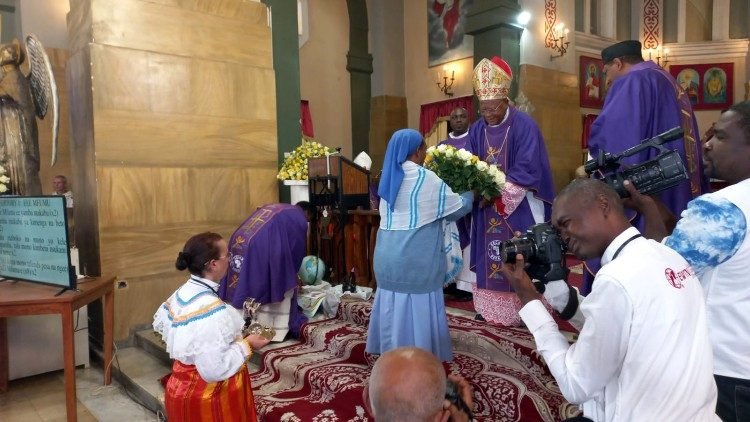The synodal journey will undoubtedly open a new page in the coming decades, as did the Second Vatican Council. This is the impression of Hatem Bourial, a Muslim from Carthage, Tunisia, who participated in the African continental phase of the synod on synodality in Addis Ababa, Ethiopia.
Stanislas Kambashi, SJ – Vatican City and Lambert Riyazimana – Addis Ababa, Ethiopia.
Hatem Bourial was speaking as a Muslim widely engaged with ecumenism and interreligious dialogue.
The African continental phase of the Synod on Synodality, held in Addis Ababa, Ethiopia, from 1 to 6 March, brought together more than 200 participants from 41 African countries and the Islands. Participants also comprised Ethiopians as hosts and guests from other continents, particularly those from the General Secretariat for the Synod of Bishops of the Holy See. One hundred lay people taking part included 32 young people and 50 women. There were also some consecrated persons, priests, Bishops and Cardinals.
The Synod in Addis Ababa also welcomed guests from other religious traditions: Muslims and members of traditional African religions. Equally invited were Christians from other denominations.

Addis Ababa continental synod assembly.
Hatem Bourial, a Muslim from Carthage, Tunisia, who took part in the synodal meeting, underlined the value of the African Synodal process, comparing it to the Second Vatican Council, which he said opened “a new page” for the Catholic Church and its relations with other faiths.
Walking together in communion broadens horizons
In an interview conducted for Vatican News in Addis, Hatem Bourial affirmed that walking together, in his opinion, means looking towards the same destination. “It is to stay in contact; to look at each other without judgment, to stop and sometimes to go back, to adjust the initial objective.” Evoking the example of the Israelites, who in Scripture were always a “people on the march,” the Tunisian emphasised that walking also implies an effort and a relationship that is reciprocal with fellow travellers but is also reflective with oneself; and transitive when it concerns a whole group.
Reflecting on the shared journey, Hatem proposed a return to Isaiah’s reflection on the widening of the tent (Is 54:2) if we are to comprehend the precariousness and fragility of this “walking together.” He insisted that only then could we understand better that being together is a strength and being many and in communion represents more strength, stressed the Tunisian journalist.

Group picture in Addis.
Walking together in its ecumenical and interreligious dimension
Hatem Bourial suggested that the African continental Synodal be understood in an ecumenical dimension because, for him, it was an experience similar to that of the Second Vatican Council, which “opened a new page” not just for Catholics but even in its relations with other faiths. This synod also opens a new page regarding participation, communion and inclusion. Inclusion creates synergy and brings together the Christian, the Jew and the Muslim believer and, in the process, strengthens each person in their faith, observed the Carthaginian.
Referencing his own Muslim faith, Hatem pointed out that the act of walking further implies and entails an effort towards the desire for self-improvement. He said that being in rapport with others is actually the foundation of any ecumenical relationship.

Some of the participants at the Synod in Addis.
Integration and inclusion
Hatem said the African continental synod has demonstrated unequivocally the Church’s capacity to integrate, include, and move forward. This means there will be important openings for those who are neither in the Church nor are keenly practising their faith. Hatem believes that the willingness and inclination to include and listen to members of other religions is a good signal for those in mosques and synagogues. He felt that such an approach could help solve the “disaffection gap” from which the world suffers today, leading to a loss of religious reference among individuals and society.
Moving towards universality
If we want to place ourselves in the ecumenical trajectory, added the Tunisian, it is necessary to think in terms of universality. This means putting ourselves in a historical perspective: “as much as Vatican II was important, this synod will open a new page that could last for half a century,” he said. In this universality, Hatem advocates a return to an African cultural matrix that can be expressed in the Church and ecumenical circles without losing sight of the African particularity. Moreover, he emphasises that hospitality and charity must be the foundation of this march because to widen one’s tent means to be more charitable: the love of the neighbour being the heartbeat of the Christian tradition.

SECAM President, Cardinal Fridolin Ambongo.
SECAM: Synodality in Africa, a way back to the African Palaver
Hatem expressed his appreciation for this synodal process involving participants from various backgrounds and faiths. Taking the example of himself, the Tunisian recounted his experience of often visiting the historic basilicas that make up the prestigious history of his city, Carthage. This ancient Phoenician city, neighbouring Tunis, has many ruins, remnants of a solid Christian tradition that has given the Church significant figures, like St. Cyprian (3rd century). For Hatem, these basilicas can be revived thanks to this process that takes us back to these distant historical roots. Carthage’s Christian history should therefore inspire the ecumenical process.
By participating in the African continental synodal march, Hatem found his mind going back to what happened in Carthage -a place where some great discussions of Catholicism occurred. Thanks to this historic city, he could not help but also reminisce about the many synods that established specific Catholic doctrine points.
“Walking with you today allows me to go back to this Tunisian antiquity and see that the openness perspective is still alive. With this openness of the Church, we can converge towards common objectives, shared by all religions,” he concluded.



